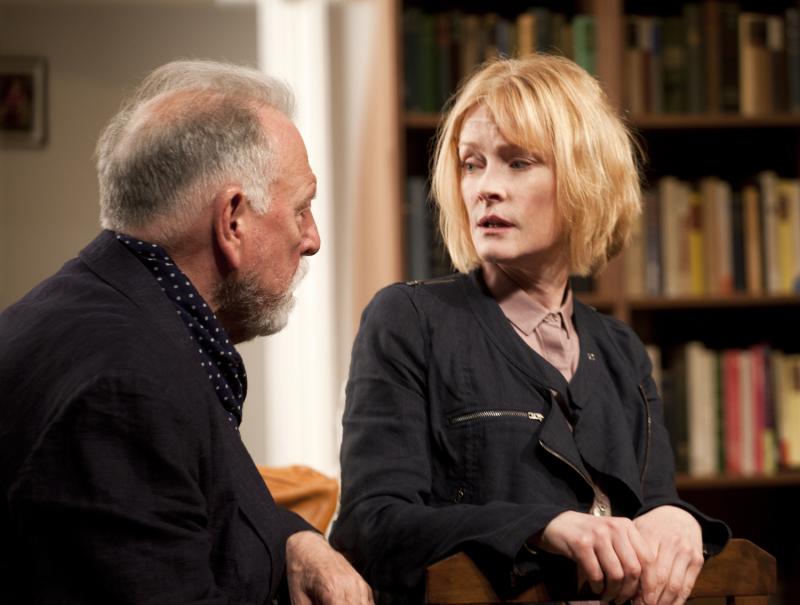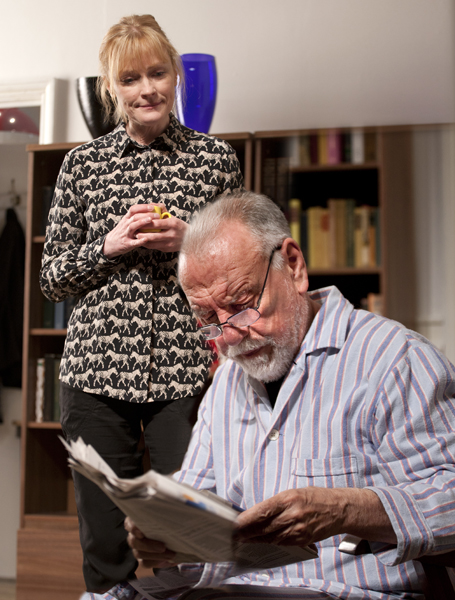The Father, Wyndham’s Theatre | reviews, news & interviews
The Father, Wyndham’s Theatre
The Father, Wyndham’s Theatre
Well-deserved West End transfer for Florian Zeller’s powerful portrait of dementia

Dementia is an increasingly common theme in theatre, television and film. But although there are plenty of stories about old people suffering from Alzheimer’s, what does it feel like to experience this condition?
Eighty-year-old André lives in a posh flat in Paris. He is suffering from loss of memory; he finds it difficult to recognise people he knows. His grown-up daughter Anne is worried, can’t cope and decides that he should move in with her and her partner Pierre. When his condition worsens, the couple discuss sending him to a nursing home. This is what happens, or is it? Maybe. Or maybe André’s condition is so bad that Anne decides to leave him while she goes away to London to live with Pierre, the new man in her life.
André is like Kafka’s K – a victim of unjust events beyond his control
Not only is the storyline uncertain, but, within minutes, André’s disorientation, his feeling that his memories and his sense of time are fugitive, is established. Is that strange woman in the flat a care-worker, or is she his other daughter, who is absent from his daily life? What does his daughter Anne look like: blond or brunette? Who is that man? Is it Pierre, and is he friend, or foe? Who is speaking and what do they want? Are they nurses or just thieves?
Zeller’s play tells its handful of incidents – a visit, a meal, an awakening – from the subjective point of view of André so the whole point is that he cannot be sure of what is happening to him. He feels raw emotions; his nerves are frayed; he longs to be mothered by his daughter; he lapses into a second childhood. At the same time, there is a literary edge to this nightmare: André is like Kafka’s K – a victim of unjust events beyond his control. At times, the violence of the language is reminiscent of Pinter: “How much longer,” asks Pierre viciously, “do you intend to hang around, getting on everyone’s tits?” It’s a clear echo of the interrogation scene in The Birthday Party.
By the end of the play, or perhaps from its very beginning, André is bedbound in a Beckettian stasis. His universe has shrunk to his sheets and his pillows and his nurse and his pills. He is free to fantasise. He once worked as a tap dancer; he used to be in a circus. He is Lear, “a very foolish fond old man”. But, at the same time, he is full of fear; needy; desperately afraid. He is living an utter nightmare. It’s worse than folly; it’s sheer horror. And the play suggests that this might be a state that is waiting for all of us.
 Christopher Hampton’s clean translation lends André a couple of verbal ticks, but most of the text is both precise and slightly impersonal. It’s efficient without being intrusive. As the furniture disappears from this old man’s world, providing a strong visual metaphor of his memory loss, James Macdonald’s production fizzes and jumps during the baroque music of the scene changes as if André’s mind was a record being dissolved in acid. But the most impressive part of this 90-minute show is the acting.
Christopher Hampton’s clean translation lends André a couple of verbal ticks, but most of the text is both precise and slightly impersonal. It’s efficient without being intrusive. As the furniture disappears from this old man’s world, providing a strong visual metaphor of his memory loss, James Macdonald’s production fizzes and jumps during the baroque music of the scene changes as if André’s mind was a record being dissolved in acid. But the most impressive part of this 90-minute show is the acting.
Kenneth Cranham’s André is a strong, bear-like figure whose authority is visibly leaching away. He can, perhaps in his own mind, be charming to attractive women; he can be rational. But he can also be violent. Paranoid. Crazy. And he can imagine suffering violence. It’s an uncomfortable performance, brilliant in its understanding and its detail. Similarly, Claire Skinner is a woman holding it together, but only just; any worsening of her father’s condition could simply blow her away. She is everywoman worried about her father. Both (pictured above) are well supported by Nicholas Gleaves as Pierre, Kirsty Oswald as a care-worker, plus Jim Sturgeon and Rebecca Charles in the other fragmentary roles. Despite its moments of unexpected humour, this is a sobering evening of cold comfort to anyone who is afraid of growing old.
rating
Explore topics
Share this article
The future of Arts Journalism
You can stop theartsdesk.com closing!
We urgently need financing to survive. Our fundraising drive has thus far raised £49,000 but we need to reach £100,000 or we will be forced to close. Please contribute here: https://gofund.me/c3f6033d
And if you can forward this information to anyone who might assist, we’d be grateful.

Subscribe to theartsdesk.com
Thank you for continuing to read our work on theartsdesk.com. For unlimited access to every article in its entirety, including our archive of more than 15,000 pieces, we're asking for £5 per month or £40 per year. We feel it's a very good deal, and hope you do too.
To take a subscription now simply click here.
And if you're looking for that extra gift for a friend or family member, why not treat them to a theartsdesk.com gift subscription?
more Theatre
 Troilus and Cressida, Globe Theatre review - a 'problem play' with added problems
Raucous and carnivalesque, but also ugly and incomprehensible
Troilus and Cressida, Globe Theatre review - a 'problem play' with added problems
Raucous and carnivalesque, but also ugly and incomprehensible
 Clarkston, Trafalgar Theatre review - two lads on a road to nowhere
Netflix star, Joe Locke, is the selling point of a production that needs one
Clarkston, Trafalgar Theatre review - two lads on a road to nowhere
Netflix star, Joe Locke, is the selling point of a production that needs one
 Ghost Stories, Peacock Theatre review - spirited staging but short on scares
Impressive spectacle saves an ageing show in an unsuitable venue
Ghost Stories, Peacock Theatre review - spirited staging but short on scares
Impressive spectacle saves an ageing show in an unsuitable venue
 Hamlet, National Theatre review - turning tragedy to comedy is no joke
Hiran Abeyeskera’s childlike prince falls flat in a mixed production
Hamlet, National Theatre review - turning tragedy to comedy is no joke
Hiran Abeyeskera’s childlike prince falls flat in a mixed production
 Rohtko, Barbican review - postmodern meditation on fake and authentic art is less than the sum of its parts
Łukasz Twarkowski's production dazzles without illuminating
Rohtko, Barbican review - postmodern meditation on fake and authentic art is less than the sum of its parts
Łukasz Twarkowski's production dazzles without illuminating
 Lee, Park Theatre review - Lee Krasner looks back on her life as an artist
Informative and interesting, the play's format limits its potential
Lee, Park Theatre review - Lee Krasner looks back on her life as an artist
Informative and interesting, the play's format limits its potential
 Measure for Measure, RSC, Stratford review - 'problem play' has no problem with relevance
Shakespeare, in this adaptation, is at his most perceptive
Measure for Measure, RSC, Stratford review - 'problem play' has no problem with relevance
Shakespeare, in this adaptation, is at his most perceptive
 The Importance of Being Earnest, Noël Coward Theatre review - dazzling and delightful queer fest
West End transfer of National Theatre hit stars Stephen Fry and Olly Alexander
The Importance of Being Earnest, Noël Coward Theatre review - dazzling and delightful queer fest
West End transfer of National Theatre hit stars Stephen Fry and Olly Alexander
 Get Down Tonight, Charing Cross Theatre review - glitz and hits from the 70s
If you love the songs of KC and the Sunshine Band, Please Do Go!
Get Down Tonight, Charing Cross Theatre review - glitz and hits from the 70s
If you love the songs of KC and the Sunshine Band, Please Do Go!
 Punch, Apollo Theatre review - powerful play about the strength of redemption
James Graham's play transfixes the audience at every stage
Punch, Apollo Theatre review - powerful play about the strength of redemption
James Graham's play transfixes the audience at every stage
 The Billionaire Inside Your Head, Hampstead Theatre review - a map of a man with OCD
Will Lord's promising debut burdens a fine cast with too much dialogue
The Billionaire Inside Your Head, Hampstead Theatre review - a map of a man with OCD
Will Lord's promising debut burdens a fine cast with too much dialogue

Add comment